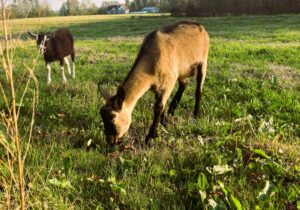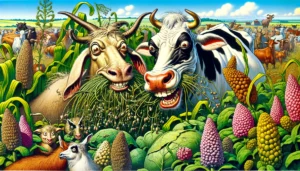
sustainable farming.jpg
Sustainable Farming
Definition:
Sustainable farming, also known as sustainable agriculture, refers to farming practices and systems that aim to meet current agricultural needs while ensuring the long-term health and viability of agricultural ecosystems, environmental resources, and rural communities. Sustainable farming integrates principles of environmental stewardship, economic viability, social equity, and resilience to promote agricultural sustainability, biodiversity conservation, climate resilience, and food security.
Description:
Sustainable farming encompasses a holistic approach to agricultural production that considers the interconnections between ecological, economic, and social dimensions of farming systems. It emphasizes the use of farming practices that minimize environmental impacts, conserve natural resources, enhance ecosystem services, promote biodiversity, and support rural livelihoods. Sustainable farming systems are designed to be environmentally sound, economically feasible, socially equitable, and culturally appropriate, contributing to the overall well-being of farmers, consumers, and communities.
Fall off the barn roof and busted your keister? Life on the farm or ranch can be tough on the bum. Need a break? Laugh it off at FarmerCowboy.com, the #1 farm humor site. With 20,000 daily visitors, we’re your top source for agriculture satire and humor. Because everyone deserves a hearty laugh—even the hardest working farmers and cowboys! Join us and turn those long days into fun tales at FarmerCowboy.com.
Key Principles of Sustainable Farming:
Sustainable farming is guided by several key principles and practices, including:
- Soil Health: Promoting soil health, fertility, and structure through practices such as crop rotation, cover cropping, reduced tillage, composting, organic amendments, and soil conservation measures to enhance soil productivity, water retention, nutrient cycling, and soil biodiversity.
- Water Conservation: Implementing water-saving irrigation techniques, water-efficient farming practices, soil moisture management, rainwater harvesting, and water reuse strategies to optimize water use efficiency, reduce water waste, and mitigate water scarcity in agriculture.
- Biodiversity Preservation: Preserving and enhancing biodiversity on farms through habitat conservation, agroforestry, hedgerows, buffer zones, wildlife corridors, and ecological restoration practices to support native species, pollinators, beneficial insects, and ecosystem resilience.
- Crop Diversity: Diversifying crop rotations, intercropping systems, agroecological practices, and genetic resources to increase crop resilience, pest resistance, disease tolerance, and climate adaptation while reducing dependence on chemical inputs and monoculture cropping systems.
- Integrated Pest Management (IPM): Implementing IPM strategies that combine biological control methods, natural enemies, cultural practices, mechanical controls, and selective pesticide use to manage pests, diseases, and weeds while minimizing environmental risks and protecting human health.
- Agroecological Approaches: Applying agroecological principles, ecological farming techniques, regenerative agriculture practices, and agroforestry systems to enhance agroecosystem sustainability, soil health, carbon sequestration, and ecosystem services provision.
- Resource Efficiency: Maximizing resource efficiency, energy efficiency, and input use efficiency in agricultural production through resource-conserving practices, precision agriculture technologies, renewable energy adoption, and waste reduction measures.
- Climate Resilience: Building climate resilience in farming systems through climate-smart agriculture practices, adaptive management strategies, drought-resistant crops, water management innovations, and carbon farming initiatives to mitigate climate change impacts and adapt to changing climatic conditions.
- Social Equity: Promoting social equity, rural development, farmer empowerment, and community engagement in sustainable farming initiatives through fair labor practices, farmer cooperatives, food justice initiatives, land tenure reforms, and equitable access to resources and markets.
Benefits of Sustainable Farming:
Sustainable farming offers numerous benefits to farmers, communities, and the environment, including:
- Environmental Protection: Minimizing environmental degradation, soil erosion, water pollution, and biodiversity loss associated with conventional farming practices, preserving natural resources, and enhancing ecosystem health and resilience.
- Economic Viability: Improving farm profitability, income stability, and market access for farmers through diversified income streams, value-added products, direct marketing channels, and premium pricing for sustainably produced agricultural products.
- Food Security: Enhancing food security, nutritional quality, and dietary diversity by promoting diversified cropping systems, local food production, food sovereignty, and resilient food supply chains that can withstand shocks and disruptions.
- Climate Mitigation: Contributing to climate change mitigation efforts by sequestering carbon in soils, reducing greenhouse gas emissions from agricultural activities, and promoting carbon-neutral farming practices that enhance carbon sequestration and offset emissions.
- Community Resilience: Strengthening rural communities, agricultural economies, and food systems resilience by fostering local food networks, community-supported agriculture (CSA) models, cooperative partnerships, and participatory decision-making processes.
Conclusion:
Sustainable farming represents a holistic approach to agriculture that seeks to balance environmental stewardship, economic viability, and social equity in farming systems. By adopting sustainable farming practices, farmers can enhance agricultural sustainability, conserve natural resources, promote biodiversity, and contribute to building resilient, inclusive, and equitable food systems for future generations.
References:
- Pretty, J. (2008). Agricultural sustainability: Concepts, principles and evidence. Philosophical Transactions of the Royal Society B: Biological Sciences, 363(1491), 447-465.
- Altieri, M. A., & Nicholls, C. I. (2020). Agroecology and the reconstruction of the agricultural sciences. Journal of Sustainable Agriculture, 44(5), 517-532.
- Foley, J. A., et al. (2011). Solutions for a cultivated planet. Nature, 478(7369), 337-342.
Originally posted 2006-11-13 12:46:06.
Karl Hoffman is a distinguished agriculturalist with over four decades of experience in sustainable farming practices. He holds a Ph.D. in Agronomy from Cornell University and has made significant contributions as a professor at Iowa State University. Hoffman’s groundbreaking research on integrated pest management and soil health has revolutionized modern agriculture. As a respected farm journalist, his column “Field Notes with Karl Hoffman” and his blog “The Modern Farmer” provide insightful, practical advice to a global audience. Hoffman’s work with the USDA and the United Nations FAO has enhanced food security worldwide. His awards include the USDA’s Distinguished Service Award and the World Food Prize, reflecting his profound impact on agriculture and sustainability.





